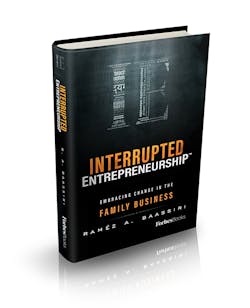The flip side: about 70 percent of family-owned businesses in the U.S. and worldwide fail, or are sold, before the second generation can assume ownership. And only 10-15 percent make it to the third generation.
“Family business that do survive are the ones willing to keep an eye on new horizons,” says Raméz Baassiri, author of Interrupted Entrepreneurship: Embracing Change in the Family Business (www.ramezbaassiri.com).
Baassiri helps run a multi-generational, multi-national family business. He says being open to change and innovation is one key to keeping a business relevant and successful throughout generations.
“Just because a business model or product has worked in the past doesn’t mean it will continue to do so,” Baassiri says. “Stagnancy or struggle provide an opportunity to negotiate a different path. Family businesses need to confront market realities and consider disruptive new things in order to move forward.”
Baassiri provides four ways family businesses can survive and grow from generation to generation:
1. Cultivate entrepreneurs. A big challenge for family businesses is making sure everyone from different generations is heard. “Sometimes the creativity and innovation of the newest generation is all that stands between success and failure,” Baassiri says.
Employees have traditionally offered suggestions in a variety of ways, from contests to the basic suggestion box. But there are other ways to contribute.
“The HVAC industry has a lot of scope for improvement, which means that the next great idea could have the potential to redefine the market,” Baassiri says. “Set some time aside every week for a period of contemplation or idea generation. This would be for every employee, from the mailroom to the C-suite,” he suggests. “Successful leaders understand the best ideas can come from the unlikeliest of places. Your company’s next great design idea might not come from the design team, but maybe from someone in operations.”
2. Build on your core. Baassiri says the core elements of running a family business — how to evaluate a balance sheet, review a marketing plan, and initiate an advertising process — should be grasped by multiple family members in order to build a solid structure. “You need to have that core knowledge that can be carried from one family business and generation to another,” Baassiri says. “And re-educating yourself and others is an invaluable quality to growing the family business.”
For family members who may not have attended college or are constrained by family responsibilities, there are other ways to learn key business principles.
“I think we are living in the golden age of learning,” Baassiri says. “There are so many resources out there for people of all ages with a desire to learn. Whether you’re looking to add more skills to your current job profile or venture into an entirely new arena like technology or management, there are a lot of resources to turn to. Depending on what you’re looking for, what works for you and your temperament, you can choose between books, local tutorial classes, online courses, YouTube videos and more.
“Most of these are readily available for you at all times during the day, which means that you can tackle them at your own pace, and schedule them without eating into your professional or family times. Business leaders can directly apply the new knowledge they gain into the business, thereby truly incorporating said ideas to deliver more value.”
3. Embrace and engineer change. “There are no limits to reinventing yourself or your family business,” Baassiri says. “Our family embraced change by investing in and developing our businesses. For example, we moved from land cultivation to engineering over multiple generations.”
“If you are looking to add new services to your company’s portfolio, your source of inspiration could be closer than you think,” Baassiri says. “I would suggest you start by looking at your current set up — your assets and your infrastructure. Ask yourself if there is a new service that you could offer your customers by leveraging what you already have, or maybe with a little more investment. The answer could surprise you. Also, it is much more cost effective and profitable to add a related service line than to start an entirely new one.
Baassiri suggest turning to existing customers.
“Recall your past conversations with them, where they expressed frustration at not being able to find a reliable provider for a certain solution. Or just ask them if they are looking for something new. It could be something to add to their existing business or for a new venture. Reaching out like this not only gives you insights about the prospective demand for your new service, but you might also get to work with people you have an existing professional relationship with.”
4. Carry strong values forward. Good values sustain family businesses, Baassiri says, because they can be constant and recognizable to customers, no matter the amount of change in the marketplace. “You can’t live trying to fill the footsteps of those who went before you,” Baassiri says. “All you can do is live the values your parents taught and what the business was founded upon, teach them and continue them while seeking to move ahead.”
“When a family business grows,” Baassiri says, “it is because the family members aren’t looking at it as a cow to milk, but as a whole farm that they can work together.”
Baassiri says the most important values for people in a family business are mutual respect, a long-term vision and social responsibility.
“A family business is a group undertaking, where each member has equal stakes in its success or failure. Just because everybody is related doesn’t mean that they don't have differing opinions. Family businesses will be able to sustain themselves into the next generation only if each member feels valued and maintains respect for others and their opinions,” he explains.
Baassiri says the members of the family business must think to the future.
“When family members come together to discuss ideas and find solutions, they must remember that you never really own a family business; you only borrow it from your children. This must be one of the core philosophies that govern the daily operations of the business. The solutions and implementations should always be practical, sustainable and value-delivering, not just for the short term, but also for future generations.”
Baassiri adds that a sense of social responsibility can help a business survive and succeed across generations.
“When you are working as a close-knit group towards a single goal, it's easy to become self-centred and develop an ‘us-versus-them’worldview. To counter this, business leaders should encourage a sense of social responsibility among family members. It inspires a feeling that they're all working towards a larger purpose - something greater than just profits. It also builds intrinsic value for the business and improves its standing in the community.”










